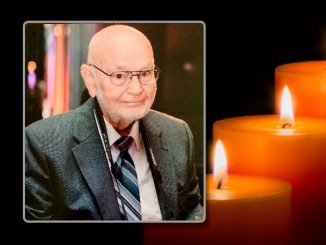
16-year-old was shot in back of head, hidden in culvert
Carolyn Springman still keeps a box of her murdered son, Jon Springman’s, belongings in the hallway of his childhood home in Metairie. Baseball trophies stick out amongst old report cards, art projects and other assorted papers.
Carolyn said her home had been the top hang-out spot for young boys growing up in the neighborhood.
“We had an above ground pool and we had 11 boys in the neighborhood, all within two years of one another. So everybody landed here for the whole summer,” Carolyn said. “Michael Fasola was the only one I never knew. He came to this house exactly two times and he gave me a really bad feeling.”
Carolyn said as Jon, her only child, grew older he became “uncontrollable” and left home at age 16 after getting into the drug scene. The last time she saw him was Sept. 4, 1999.
“It was the best I had seen Jon looking in a long time,” she said. “He looked clean. He looked clean-shaven and bathed and just looked like the old Jon with his terrific personality. He walked in the room and he jumped on me and said ‘Hey Mommy!’ which was a joke. When he wanted something I was ‘mommy.’”
In only a few days Jon would go missing.
Eighteen months later, in March of 2001, Jon’s skeletal remains were found by a fisherman deep inside a concrete culvert near the Bonnet Carré Spillway in Norco.
It was later alleged Jon had been killed by the then 17-year-old Fasola, the neighborhood friend his mother had doubts about.
“I don’t think Jon had known him maybe two months,” Carolyn said. “The police always thought that it was Michael Fasola, but without a body there was nothing they could do. So when my son’s remains were found they zeroed in on him.”
Police said that Jon, Fasola and another friend were walking near the spillway smoking marijuana and target shooting when Fasola suddenly turned his gun on Jon and shot him in the back of the head, killing him.
Following the murder, Fasola and his roommate Jason Delormier, another neighborhood friend of Jon’s, fled to Little Rock, Ark.
Police tracked down Fasola and arrested him after Jon’s remains were found.
While being held for trial, Fasola escaped from the St. Charles Parish Courthouse by piling some equipment against the wall of the third-floor exercise room in the parish courthouse and climbing down a communication tower. He then ran along the batture next to the river towards New Orleans.
Fasola was recaptured after only a few hours and later pled guilty to simple escape and carrying a concealed weapon, which earned him a four-year sentence before the murder trial ever began.
Some of the most damning evidence used in the trial was a taped confession in which Fasola said that he killed Jon because Jon had asked him to kill his mother, Carolyn. He added that he shot him in the back of the head because, “I didn’t want him to be scared when he died.”
Despite the confession, Fasola maintained his innocence.
Carolyn said Fasola’s explanation for the murder was nonsense.
“He was grasping at straws,” she said. “There’s really no reason why he did it.”
During the trial, a friend testified that he was with Jon and Fasola when he heard a “pop” and turned back around to see Jon fall.
Carolyn said the witness was intimidated by Fasola and his family and kept quiet about the murder.
Delormier also testified that he knew about the murder, but that “cowardice” stopped him from telling Carolyn.
Fasola would later receive a mandatory life sentence in 2003 when he was convicted of second-degree murder.
At age 17, Fasola was a juvenile when he committed the crime in 1999.
Now, after a U.S. Supreme Court ruling in late June overturned mandatory life sentences for juveniles, Fasola’s is one of a few sentences that may be coming up for review in St. Charles Parish.
If Fasola’s sentence is reviewed, it could result in his sentence being shortened and his eventual release.
Carolyn said although she thinks about Fasola everyday, she did not think she would have to deal with the case again.
“I go to mass every day and I say a prayer for him every day,” Carolyn said. “Praying for him is one thing, but I don’t want to see him.”
Back in 2003 she discussed the possibility of Fasola being paroled with Julie Cullen, the assistant attorney general who prosecuted the case.
“Julie and I have a pact that if Michael Fasola ever comes up for parole, even if we are in wheelchairs we will roll ourselves into the hearing,” Carolyn said.
Carolyn said as the years have passed her feelings about Fasola’s sentence have diminished.
“It has been 13 years. At this point I don’t care if he stays in jail for the rest of his life or 30 years,” Carolyn said. “It’s up to the judge. I have no control over it. I’m indifferent. None of it is going to bring my son back.”
Carolyn said she recently heard Fasola had participated in the Angola Prison Rodeo.
“I think they only allow model prisoners to participate,” Carolyn said. “Maybe now that the drugs are out of his head he has straightened up.”
Although the case was at first handled by assistant district attorney Kim McElwee, who sought the death penalty, the prosecution was turned over to the state attorney general’s office. Fasola’s attorney, Maria Chaisson, subpoenaed McElwee concerning a relationship that had developed between former St. Charles Parish detective Chad Robicheaux and Brandi Marks, Fasola’s ex-fiance and the mother of his 3-year-old daughter.
Chaisson requested a new trial prior to the sentencing, saying that the taped confession obtained by the Jefferson Parish Sheriff’s Office was coerced and that Robicheaux’s testimony was tainted due to his relationship with Marks. Chaisson’s motion was denied due to the firsthand account given by the state’s witness.
Nine years later, Chaisson said Fasola’s case is a good candidate for review.
“We are talking about someone who was 17 at the time. A lot of experts say the brain isn’t even fully developed in people at that age,” Chaisson said. “You certainly don’t always understand the consequences of your actions.”
Chaisson said she agrees with the Supreme Court’s decision.
“I think that this is exactly the type of case the Supreme Court is talking about,” Chaisson said. “These mandatory life sentences really just take it out of the hands of the judge who knows the facts.”
Any review of Fasola’s sentence would have to be initiated by himself or his legal counsel.
A representative of the state Attorney General’s Office said their office is currently reviewing options should a review be requested.




Be the first to comment